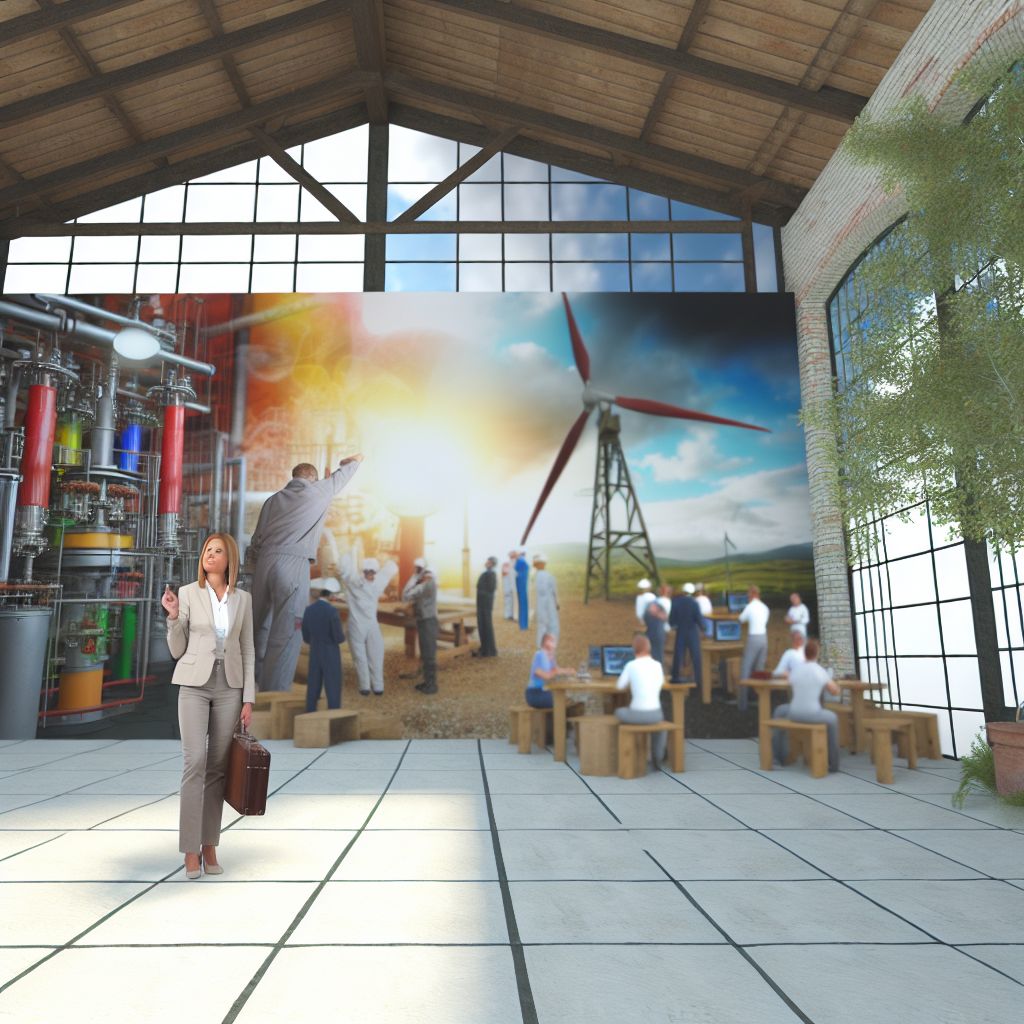English: Energy Sector / Español: Sector Energético / Português: Setor de Energia / Français: Secteur de l'Énergie / Italiano: Settore Energetico
Energiebranche bezeichnet im industriellen Kontext den Wirtschaftszweig, der sich mit der Produktion, Verteilung und Nutzung von Energie befasst. Sie umfasst sämtliche Aktivitäten, die erforderlich sind, um Energiequellen zu erschließen, sie in nutzbare Formen umzuwandeln und diese an Verbraucher oder Unternehmen zu liefern.
Allgemeine Beschreibung

Die Energiebranche spielt eine zentrale Rolle in der Industrie, da sie die Grundlage für nahezu alle wirtschaftlichen und technologischen Prozesse liefert. Sie umfasst sowohl traditionelle Energieträger wie fossile Brennstoffe (Kohle, Öl, Erdgas) als auch erneuerbare Energiequellen (Sonne, Wind, Wasser, Biomasse, Geothermie). Die Branche entwickelt und betreibt Infrastruktur wie Kraftwerke, Stromnetze, Pipelines und Energiespeicher.
Mit der zunehmenden Bedeutung von Nachhaltigkeit und Klimaschutz befindet sich die Energiebranche in einem tiefgreifenden Wandel. Unternehmen investieren verstärkt in erneuerbare Energien, intelligente Netze (Smart Grids) und Technologien zur Energieeffizienz. Gleichzeitig bleibt die Herausforderung bestehen, die Versorgungssicherheit und Wirtschaftlichkeit in einem sich schnell ändernden regulatorischen und technologischen Umfeld zu gewährleisten.
Spezielle Aspekte der Energiebranche
Dekarbonisierung:
Die Energiebranche spielt eine Schlüsselrolle bei der Reduzierung von Treibhausgasemissionen, insbesondere durch den Ausbau erneuerbarer Energien und den Einsatz von CO₂-Abscheidungs- und Speichertechnologien (Carbon Capture and Storage, CCS).
Digitalisierung:
Moderne Technologien wie IoT, KI und Blockchain werden genutzt, um Energiesysteme effizienter und flexibler zu machen, insbesondere durch die Integration dezentraler Energiequellen und den Aufbau intelligenter Netze.
Regulatorischer Rahmen:
Die Branche ist stark reguliert, da Energieversorgung als kritische Infrastruktur gilt. Internationale Abkommen wie das Pariser Klimaabkommen und nationale Energiewende-Strategien prägen ihre Entwicklung.
- Erzeugung: Betrieb von Kraftwerken zur Energieerzeugung aus fossilen und erneuerbaren Quellen.
- Verteilung: Aufbau und Wartung von Stromnetzen, Gasleitungen und anderen Infrastrukturen zur Energieübertragung.
- Speicherung: Entwicklung von Energiespeichersystemen wie Batterien, Pumpspeicherkraftwerken oder Wasserstoffspeichern.
- Energiehandel: Kauf und Verkauf von Energie auf nationalen und internationalen Märkten.
- Technologieentwicklung: Forschung und Innovation in Bereichen wie Solarzellen, Windturbinen, Kernfusion und Energiemanagementsystemen.
- Dienstleistungen: Beratungen zur Energieeffizienz, Installation von Solaranlagen oder Implementierung von Smart-Home-Technologien.
Bekannte Beispiele
- RWE und E.ON (Deutschland): Große Energieversorger, die sich zunehmend auf erneuerbare Energien und Netzbetrieb konzentrieren.
- Siemens Energy: Führend in der Entwicklung von Technologien für erneuerbare Energien und Wasserstoffwirtschaft.
- Vattenfall: Engagement in der Erzeugung sauberer Energie durch Windkraft und Solarprojekte.
- Tesla Energy: Bekannt für Energiespeicherlösungen und Solartechnologien.
- Enercon: Deutscher Hersteller von Windenergieanlagen.
Risiken und Herausforderungen
- Klimawandel: Die Energiebranche steht vor der Herausforderung, die Treibhausgasemissionen drastisch zu reduzieren, um globale Klimaziele zu erreichen.
- Energieabhängigkeit: Viele Länder sind auf den Import fossiler Brennstoffe angewiesen, was geopolitische Risiken birgt.
- Volatilität der erneuerbaren Energien: Schwankungen bei Solar- und Windenergie erfordern innovative Lösungen zur Netzstabilisierung.
- Kosten für Infrastruktur: Der Ausbau erneuerbarer Energien und intelligenter Netze erfordert hohe Investitionen.
- Regulatorische Unsicherheiten: Änderungen in der Energiepolitik können erhebliche Auswirkungen auf Investitionen und Marktstrategien haben.
Ähnliche Begriffe
- Energiewirtschaft: Ein Synonym, das die wirtschaftlichen und technischen Aspekte der Branche umfasst.
- Versorgungswirtschaft: Bezieht sich auf Unternehmen, die grundlegende Dienstleistungen wie Energie, Wasser oder Telekommunikation bereitstellen.
- Erneuerbare Energien: Ein Teilbereich der Energiebranche, der sich auf nachhaltige Energiequellen konzentriert.
- Energiesysteme: Die Gesamtheit von Technologien und Prozessen zur Energieerzeugung, -verteilung und -nutzung.
Weblinks
- maritime-glossary.com: 'Energy Sector' im maritime-glossary.com (Englisch)
Zusammenfassung
Die Energiebranche ist ein essenzieller Bestandteil der Industrie und der globalen Wirtschaft. Sie versorgt Unternehmen und Haushalte mit der notwendigen Energie, fördert Technologische Innovationen und trägt zur Erreichung von Klimazielen bei. Trotz zahlreicher Herausforderungen wie Dekarbonisierung und Infrastrukturkosten bleibt die Branche ein zentraler Treiber für Fortschritt und Nachhaltigkeit.
--
Ähnliche Artikel zum Begriff 'Energiebranche' | |
| 'Energieindustrie' | ■■■■■■■■■■ |
| Energieindustrie bezeichnet im Industriekontext den Sektor, der sich mit der Produktion, Verteilung, . . . Weiterlesen | |
| 'Biomasse' | ■■■■■■■■■■ |
| Biomasse im Industrie Kontext bezieht sich auf organische Materialien, die als Energiequelle oder in . . . Weiterlesen | |
| 'Energieerzeugung' | ■■■■■■■■■■ |
| Energieerzeugung im Industrie Kontext bezieht sich auf den Prozess der Umwandlung verschiedener Energieformen . . . Weiterlesen | |
| 'Dekarbonisierung' | ■■■■■■■■■■ |
| Dekarbonisierung im Industriekontext bezieht sich auf den Prozess der Reduzierung oder Eliminierung von . . . Weiterlesen | |
| 'Beschaffung' | ■■■■■■■■■ |
| Beschaffung bezeichnet im industriellen Kontext die Planung, Organisation und Durchführung des Einkaufs . . . Weiterlesen | |
| 'Energie und Umwelt' | ■■■■■■■■■ |
| Energie und Umwelt im Industriekontext beziehen sich auf das Zusammenspiel zwischen der Produktion, dem . . . Weiterlesen | |
| 'Energiesektor' | ■■■■■■■■■ |
| Energiesektor bezeichnet den Wirtschaftsbereich, der mit der Produktion, dem Transport und dem Vertrieb . . . Weiterlesen | |
| 'Stromnetz' | ■■■■■■■■■ |
| Stromnetz bezieht sich im industriellen Kontext auf ein System von miteinander verbundenen elektrischen . . . Weiterlesen | |
| 'Energieprojekt' | ■■■■■■■■■ |
| Energieprojekt bezieht sich auf die Planung, Entwicklung, Umsetzung und den Betrieb von Projekten zur . . . Weiterlesen | |
| 'Energiewirtschaft' | ■■■■■■■■ |
| Energiewirtschaft bezeichnet den Wirtschaftszweig, der sich mit der Produktion, der Verteilung und dem . . . Weiterlesen | |

 Dieses Lexikon ist ein Produkt der quality-Datenbank.
Dieses Lexikon ist ein Produkt der quality-Datenbank.